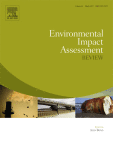Research article: Assessing eco-efficiency: A metafrontier directional distance function approach using life cycle analysis
 Author: Mercedes Beltrán-Esteve, Ernest Reig-Martínez and Vicent Estruch-Guitart
Author: Mercedes Beltrán-Esteve, Ernest Reig-Martínez and Vicent Estruch-Guitart
Title: Assessing eco-efficiency: A metafrontier directional distance function approach using life cycle analysis
Source: Environmental Impact Assessment Review
Abstract: Sustainability analysis requires a joint assessment of environmental, social and economic aspects of production processes. Here we propose the use of Life Cycle Analysis (LCA), a metafrontier (MF) directional distance function (DDF) approach, and Data Envelopment Analysis (DEA), to assess technological and managerial differences in eco-efficiency between production systems. We use LCA to compute six environmental and health impacts associated with the production processes of nearly 200 Spanish citrus farms belonging to organic and conventional farming systems. DEA is then employed to obtain joint economic-environmental farm's scores that we refer to as eco-efficiency. DDF allows us to determine farms' global eco-efficiency scores, as well as eco-efficiency scores with respect to specific environmental impacts. Furthermore, the use of an MF helps us to disentangle technological and managerial eco-inefficiencies by comparing the eco-efficiency of both farming systems with regards to a common benchmark. Our core results suggest that the shift from conventional to organic farming technology would allow a potential reduction in environmental impacts of 80% without resulting in any decline in economic performance. In contrast, as regards farmers' managerial capacities, both systems display quite similar mean scores.
View article
Recommended citation:
Beltrán, M., E. Reig and V. Estruch (2017): "Assessing eco-efficiency: A metafrontier directional distance function approach using life cycle analysis", Environmental Impact Assessment Review, 63, marzo, pp. 116-127.






